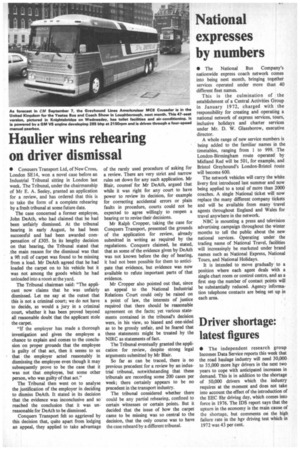Haulier wins rehearing on driver dismissal
Page 23

If you've noticed an error in this article please click here to report it so we can fix it.
• C °millers Transport Ltd, of New Cross, London SEI4, won a novel case before an Industrial Tribunal sitting in London last week. The Tribunal, under the chairmanship of Mr E. A. Seeley. granted an application for a review, and has ordered that this is to take the form of a complete rehearing by a fresh tribunal at some future date.
The case concerned a former employee, John DeAth, who had claimed that he had been unfairly dismissed. At the tribunal hearing in early August, he had been successful and had been awarded compensation of £305. In its lengthy decision on that hearing, the Tribunal stated that the main reason for the dismissal was that a 9ft roll of carpet was found to be missing from a load. Mr DeAth agreed that he had loaded the carpet on to his vehicle but it was not among the goods which he had unloaded into a moth at the yard.
The Tribunal chairman said: "The applicant now claims that he was unfairly dismissed. Let me say at the outset that this is not a criminal court; we do not have to decide, as would a jury in a criminal court, whether it has been proved beyond all reasonable doubt that the applicant stole the carpet.
"If the employer has made a thorough investigation and given the employee a chance to explain and comes to the conclusion on proper grounds that the employee is guilty of that act, then it seems to us that the employer acted reasonably in dismissing the employee even though it may subsequently prove to be the case that it was not that employee, but some other person, who was guilty of that act."
The Tribunal then went on to analyse the justification of the employer in deciding to dismiss DeAth. It stated in its decision that the evidence was inconclusive and so reached the conclusion that it was unreasonable for DeAth to be dismissed.
Conquers Transport felt so aggrieved by this decision that, quite apart from lodging an appeal, they applied to take advantage of the rarely used procedure of asking for a review. There are very strict and narrow rules set down for any such application. Mr Blair, counsel for Mr DeAth, argued that while it was right for any court to have power to review its decision, for example for correcting accidental errors or plain faults in procedure, courts could not be expected to agree willingly to reopen a hearing or to revise their decisions.
Mr Ralph Cropper, taking the case for Conquers Transport, presented the grounds of the application for review, already submitted in writing as required by the regulations. Conquers claimed, he stated, that as some of the evidence given by DeAth was not known before the day of hearing, it had not been possible for them to anticipate that evidence, but evidence was now available to refute important parts of that evidence.
Mr Cropper also pointed out that, since an appeal to the National Industrial Relations Court could only be raised on a point of law, the interests of justice required that there should be reasonable agreement on the facts; yet various statements contained in the tribunal's decision were, in his view, so biased and one-sided as to be grossly unfair, and he feared that these statements might be treated by the NIRC as statements of fact.
The Tribunal eventually granted the application for review, despite strong legal arguments submitted by Mr Blair.
So far as can be traced, there is no previous precedent for a review by an industrial tribunal, notwithstanding that these tribunals are recording some 200 cases per week; there certainly appears to be no precedent in the transport industry.
The tribunal considered whether there could be any partial rehearing, confined to certain witnesses or certain points. But it decided that the issue of how the carpet came to be missing was so central to the decision, that the only course was to have the case reheard by a different tribunal.












































































































